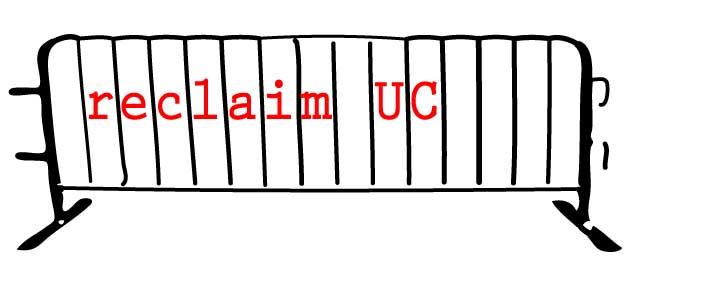
Today, the Daily Cal reports what we've known for awhile: that faculty, with a few important and inspiring exceptions, are no longer part of what is now a student-worker alliance against the privatization of public education.
“The faculty is a whole range — we don’t agree on anything except that we want this place to be great," Jacobsen said. "We differ on tactics, on strategy, even sometimes on what great means, but we want this university to be great."It's important to acknowledge that this phenomenon is not new -- it just took the Daily Cal a year or two to figure it out. Since the 2009 September walkout, faculty have remained deeply divided about potential responses to privatization -- from embracing tuition hikes to preserve "excellence" and proposing that flagship institutions like UC Berkeley become autonomous from the rest of the UC system to attempting to channel popular outrage into support for a California ballot initiative and Democratic party legislators (a faith in in the Democratic Party which has had devastating consequences for California public higher education).
Split between the more politically moderate SAVE and the more activist Solidarity Alliance, ladder-rank faculty willing to speak out against privatization were from the very beginning a tiny fraction of total faculty. Although there are exceptions, ladder-rank faculty have historically shown little to no interest in supporting, for example, ongoing university staff labor union struggles and opposing UCOP's infamous pattern of intimidation and open contempt for organized labor -- from unionized graduate students to unionized librarians.
We've been discussing these issues here for some time. Last November, for example, we examined the comments made by a number of faculty members regarding the round of protests, walk-outs, and occupations that took place in 2009-2010. What they said made clear that they no longer saw themselves as participants or even understood the rationale for public protest, let alone potentially disruptive protest. There was a strong sense that the faculty saw themselves instead as "standing on the sidelines, observers of what is essentially a student movement...bystanders." Though ladder-rank faculty are simply not impacted by the tuition hikes the way students themselves are, many faculty (especially those without tenure) hate the way the university is being managed but often continue to observe the education "movement" as though they were outside of it and as though it were a single homogeneous organization.
More recently, of course, we examined the striking lack of solidarity found in the recommendations of the Academic Council of the Academic Senate, seen in the Daily Cal article as the one remaining site from which faculty are attempting to contest the administration's plans. In these recommendations, the Council not only comes out in favor of tuition increases for students but also endorses the expansion of contingent/precarious adjunct labor at the UC -- a superexploited class of lecturers with no benefits, health insurance, or job protections which as others have pointed out is a fundamental policy tenet of the privatization of higher education nationally. Obviously these views do not represent the entirety of the UC faculty, but the distance between these recommendations and the original general demands of the SAVE faculty group are stark:
"To ensure the future of the University of California as the world’s premier public university system:
- We demand that Gov. Schwarzenegger, the legislature, and the Board of Regents fulfill the Higher Education Compact (2005) and reaffirm the commitments set forth in the Master Plan for Higher Education (Donahoe Act; 1960).
- We oppose the Board of Regents’ privatization strategies and call on the Office of the President to act in concert with faculty to preserve the highest level of excellence in the core teaching and research missions of the University.
- We urge UC alumni to support these missions as their highest priority.
- We insist upon greater administrative and budgetary transparency in recognition of the principle of shared governance."
Despite a litany of familiar criticisms about leaderlessness and demandlessness, the recent proliferation of "Occupy Wall Street"-inspired protests should remind us that the California public education "movement" was never simply one organization, body, or program, but an cross-sectoral coalition of different groups organizing teach-ins, poetry readings, general assemblies, speakouts, townhalls, and statewide organizing meetings among organized labor groups.
Part of the vibrancy of the "movement" was due to the fact that no single organization monopolized this field of different constituencies, each impacted differently by tuition hikes, layoffs, budget cuts, and intensifying campus racism. There is simply no reason, other than political fatalism or squeamishness around longstanding activist debates about direct action or "diversity of tactics," why such educational or outreach events cannot be organized again by concerned faculty or any other student group impacted by the cuts.
Readers of this blog can draw their own conclusions about the effectiveness of continuing to petition Sacramento legislators versus the combination of outreach, education, and disruptive political actions which California witnessed briefly in 2009--where concerned students, staff, and faculty each played an important role in creating the conditions for mass mobilization.

